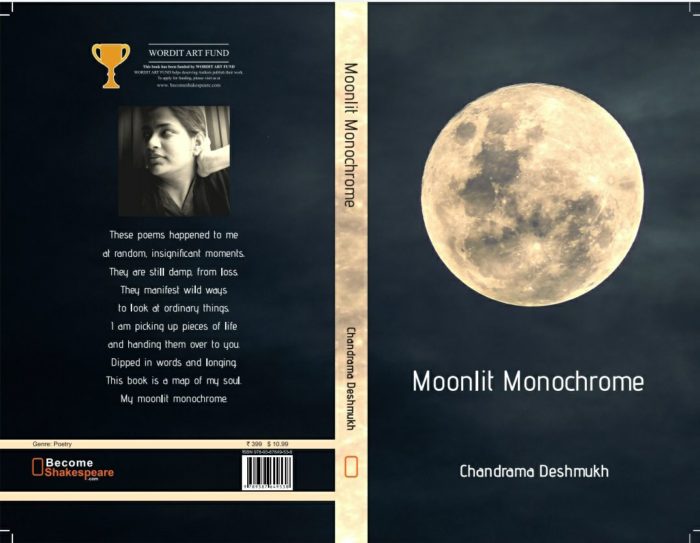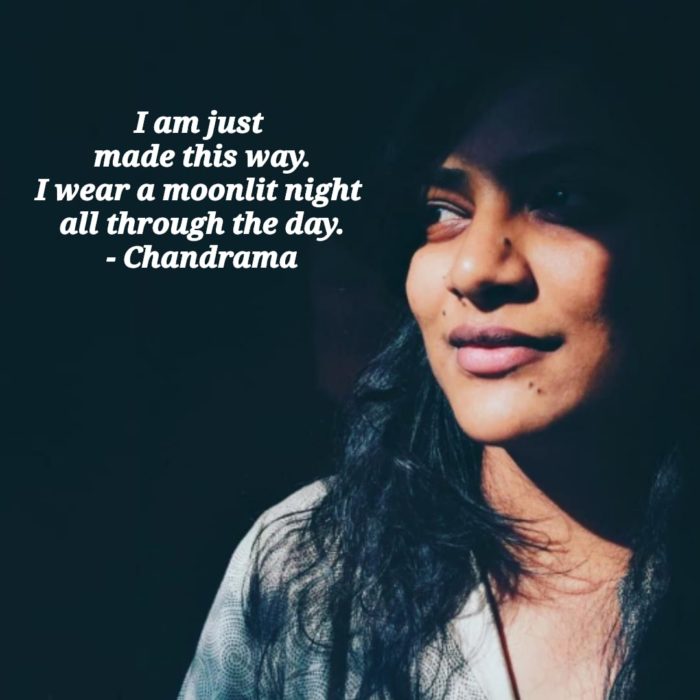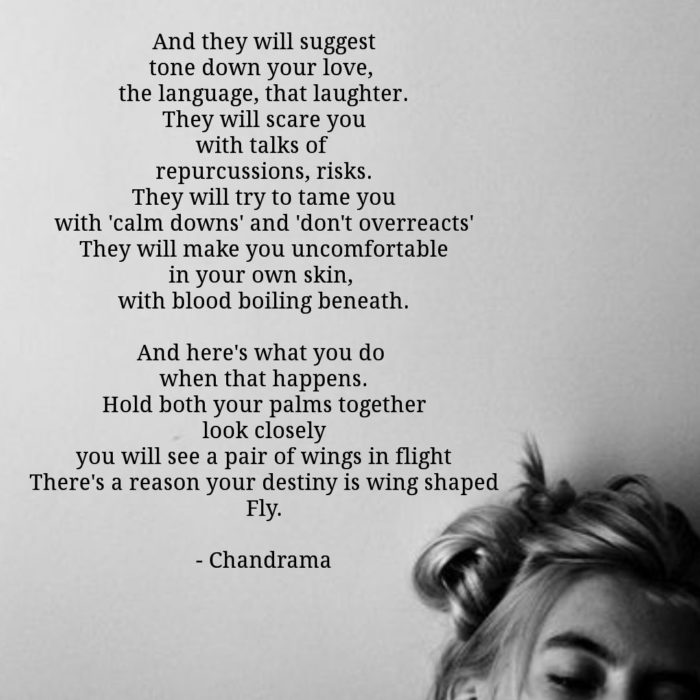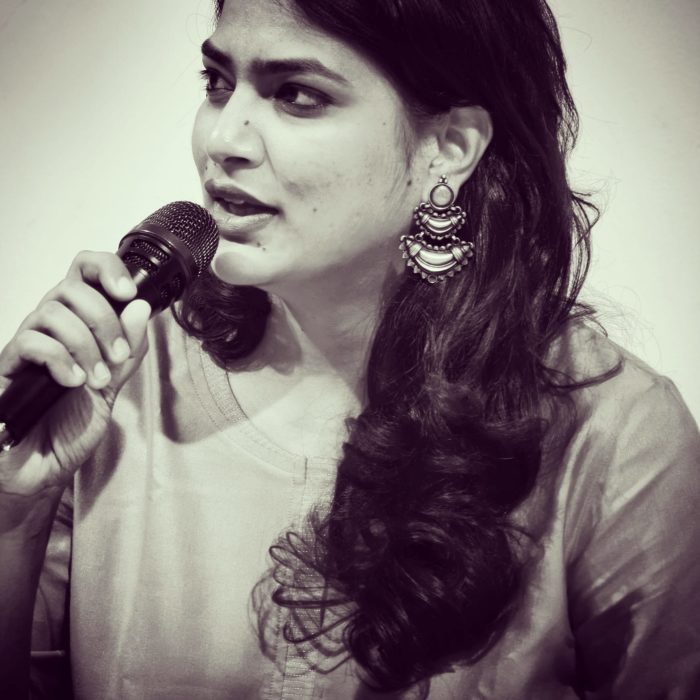Yes, Chandrama Deshmukh is a woman of many words. She is a writer, an author, and a poetess. She pens down her thoughts so beautifully that even her imagination makes sense.

She has recently published her maiden book “Moonlit Monochrome” which is receiving rave reviews by the readers. She is not just a writer but also a storyteller and you will find her casting a spell with words at many events. Here is what she has to say about her journey

What books have most influenced your life?
I read a lot, so the list is pretty long. Every book leaves something of it in my conscious.
Today, the best five I can remember are:
The Forty Rules Of Love.
The Glass Castle.
Osho – Book Of Woman
Letters To The Young Poet
Gulzar’s Raat Pashmine Ki
How did you decide on writing, was it planned or did it happen by chance?
It happened by chance. I wrote my first poem when I was in class 7th. My dad had an inclination towards literature and we often read poems and excerpts to each other. Poetry was brewing in me from a young age. I wrote my first poem without realizing that I am writing a poem.

How do you develop your plots and characters/ how do you choose your poem topics and who is your muse?
Again, poems happen to me. It’s like thoughts are brewing and I am just a medium of the universe to give them words. I don’t choose words, they choose me. It’s like a piece of music coming together in some kind of symphony if you know what I mean.
The moon is my muse. Has always been.
We all need a hero! Tell us about your protagonist(s)/Muse. Was there a real-life inspiration behind it?
My dad. Moonlit Monochrome is dedicated to him. He named me moon, and since then, life has been an ongoing poem.
What real-life inspirations did you draw from for the world building within your book?
I believe all art erupts from real life. It is the journey from what is to what you wish it to be. My book has poems from many real-life experiences that have molded me, introduced me to the world within, given me the power to transform thoughts into words.
What was the marketing strategy you used and what were the results?
Social media is my genie! The popular social platforms are such an amazing way to reach like-minded people. I actively use my Facebook and Instagram pages to share my poems. The results are beyond my expectations. The power of digital media is phenomenal. I marketing strategy involves posting content regularly and choosing the right target audience to make an impact.
Do you believe that today marketing on social media works better than word of mouth?
Indeed. Social media is the king, and a generous king I must say. Most of my work has reached people through social media. Most artists are incapable of boasting about their work. Social media makes it such a cakewalk (in my case, moonwalk :))
What was the hardest part of writing this book?
Getting Moonlit Monochrome out was not an easy task. Keeping logistics aside, I was way too attached to these poems. It was like sharing the most sensitive parts of my thoughts with people, and the loved ones. But then something within told me, art is not meant to be caged; it needs to fly, it needs to bloom. These poems are about and for those innumerable restless beings like me, who have spent sleepless nights making wishes under shooting stars who have spent hours and hours, nursing their scars!

What was your favorite chapter (or part) to write and why?
Honestly, my favorite part is the forward of the book where I talk about how a poem happens to you. This book is a map of my soul, so I can’t really place my finger on what is best. But yes, the forward, was the way forward.
And then, moonisms: a series of small two-three liner poems hanging on a moonbeam. I love them.
Did you learn anything from writing this book and what was it?
Oh yes, I learned that no matter how tough it looks, getting it out and pouring your thoughts on paper always helps. it’s such a comforting feeling to know you’re not alone in this journey. There are many like you, and your words mean the world to them. The messages that have been pouring in on my page make me realize, there are so many people out there, who needed this Moonlit Monochrome, as much as I did.
Do you want each book to stand on its own, or are you trying to build a body of work with connections between each book?
This book is complete in itself. And so is each poem in it. I want this book to stand on its own. I wouldn’t deny it’s connection to my previous or future works, but that solely depends on the reader.
Do you try more to be original or to deliver to readers what they want?
When it comes to poetry, there is no option but to be original. But I don’t write what people want to read. My poems are a map of my soul. They are what they are. All I promise my readers is honesty.

Do you think someone could be a writer if they don’t feel emotions strongly?
Emotions are an inherent part of human nature. What makes one person different from the other is how s/he chooses to deal with it. And yes, one can be a writer even if they don’t feel emotions strongly. As long as you feel, you can write.
What other authors are you friends with, and how do they help you become a better writer?
I am friends with many poets and authors. The conversations I have with them inspire me to write. The discussions we have open up a world of possibilities. Some of my favorite friend poets/writers are Veerendra Shivhare (Hindi poet) Deevas Gupta, Nupur Govila, Mahrukh Shah, Hullas Arora and Ishneet Sachdeva (she has been writing letters to me for years).
Is there a message in your book that you hope readers will grasp?
No. I leave it to them. My poems are open to any interpretation, no matter how vague.
If you could tell your younger writing self-anything, what would it be?
Write more. Don’t worry about good or bad, meter, structure, rhyme, let it flow.
How did publishing your first book change your process of writing?
It hasn’t really changed anything. I still write under the moon on sleepless nights.
What does literary success look like to you?
My work is read, understood, resonates with people and is reaching where it belongs.
What’s the best way to market your books?
Social media.
What kind of research do you do, and how long do you spend researching before beginning a book?
In the case of poetry, your experiences are your research ground. So I am constantly researching, observing, understanding and creating.
Do you read your book reviews? How do you deal with bad or good ones?
I love reading my book reviews. Good ones are a high, bad ones I take as constructive criticism.
What would you like to suggest to other aspiring authors?
Write. Write your heart out. The rest shall fall in place.
What are your future project(s)?
I plan to publish many more books of my work ranging from poetry, short stories, plays and maybe a novel too.
If you couldn’t be an author, what would your ideal career be?
I know of no other way to be. There is no plan B. This is it!
Rapid Fire Questions

Do you Google yourself?
Yes
How long on average does it take you to write a book?
One year
What is your favorite childhood book?
Alice In Wonderland.
What one thing would you give up to become a better writer?
Procrastination.
How many hours a day do you write?
Depends. No fixed hours. Whenever inspiration strikes.
What is the first book that made you cry?
Letters to the young poet by Rilke.
Have you ever gotten Reader’s/Writer’s block?
Oh yes!
Did you ever consider writing under a pseudonym?
No. I love my name.
What was the best money you ever spent as a writer?
Buying an old typewriter.
What authors did you dislike at first but grew into?
Miguel de Cervantes
You can connect with Chandrama at
https://www.instagram.com/chandrama_deshmukh
https://www.goodreads.com/user/show/58588536-chandrama-deshmukh
















